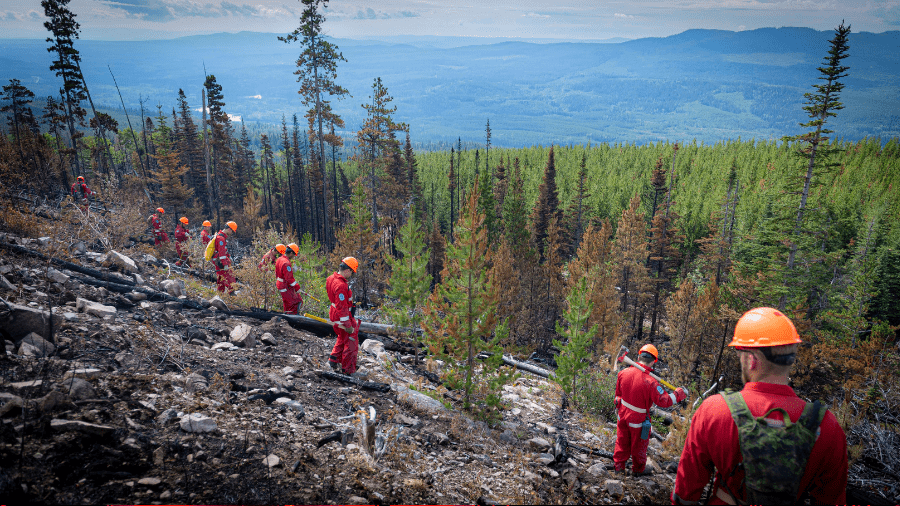This article originally appeared in the Vancouver Sun.
By Jerome Gessaroli, September 19, 2023
In recent years, we have watched wildfires become an increasing threat to communities in B.C. and across Canada, inflicting dire social and economic hardships on thousands of residents. But while reducing the number of wildfires may be difficult to achieve in the short term, it is possible to mitigate their intensity and the destruction they cause to homes, buildings, and vital resources such as watersheds.
Twenty years ago, a B.C. government report titled Firestorm 2003 outlined crucial steps needed to reduce wildfire intensity. Its recommendations included proactive forest management practices such as tree thinning, branch pruning, and ground-level brush and debris removal to reduce the spread and intensity of wildfires. However, the report provided less guidance on how to actually implement these recommendations. Regrettably, since Firestorm 2003’s publication, only 10 per cent of the necessary fuel reduction has been completed, highlighting their implementation challenges.
Certainly there are challenges to executing the recommendations, including the estimated $6 billion pricetag and the vast scale of territory to be covered — 11,000 square kilometres. Moreover, managing forests to lower wildfire effects is a perpetual commitment, requiring ongoing thinning and clearing to prevent fuel buildup. The existing approach, which relies on a limited pool of resources for communities to compete over, leads to uncertainty, and has proven insufficient.
For governments, a better method would be to explore and use market-based principles that incentivize and empower communities and Indigenous groups to carry out this work. Individuals living in wildfire-prone areas are not only highly motivated to take pre-emptive measures, but they also have the local knowledge. While the existing approach does allow local communities to take the initiative, it comes with layers of regulatory, financial, and administrative hurdles that can delay parties from taking urgent action.
For example, tree thinning and ground fuel removal approval falls under the Wildfire Act, the Forest and Range Practices Act, and involves departments such as BC Parks and the Ministry of Forests. Provincial parks and other protected areas have further restrictions to complicate the work that bordering communities must deal with.
The provincial government should create incentives that encourage local businesses to engage in forest management for wildfire mitigation. Having more community-managed forests would also help towns and districts more easily manage their forests to meet local needs.
There is commercial value in the materials removed, such as low-diameter trees and branches and even ground-level organic debris that is cleared. These organic materials can be processed into wood chips, pellets, or biochar. Wood chips and pellets — which are carbon-efficient energy sources — can be used as fuel to generate heat or electricity, replace coal in power plants, or produce ethanol.
Biochar, similar to charcoal, can be produced from plant matter and organic ground debris from the forest. It has many potential uses, from concrete additives to soil enhancers that improve crop yields. The International Panel on Climate Change considers biochar to be carbon negative, meaning its production actually reduces carbon emissions.
Besides providing local employment, benefiting the environment and reducing the cost burden to government, harvesting these materials also mitigates wildfire risk to communities and Indigenous populations. Regulations would also be designed to allow businesses to secure access to the feedstock, which is essential before capital can be invested in processing facilities.
Governments are well suited to facilitate contact between local communities and commercial enterprises. For example, Takachar, a UBC spinoff company, has created a mobile bioprocessing unit that converts biomass into biochar. Small mobile processing units can lower the cost of production.
Wildfire mitigation is just one example of using market-based principles to strengthen environmental policy, and on Oct. 3 a workshop organized by the B.C. Institute of Technology will further explore the potential and benefits of aligning local initiatives with market incentives.
By creating incentives, empowering community decision-making, and removing administrative obstacles, we can all work more collectively to address these issues that represent a deadly threat to every community.
Jerome Gessaroli is a senior fellow at the Macdonald-Laurier Institute who teaches at the B.C. Institute of Technology’s School of Business and leads BCIT’s Sound Economic Policy Project and its Oct. 3 environmental workshop.






